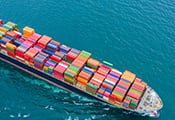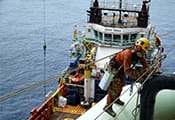Types of Marine Losses
Thanks to a variety of marine insurance plans, it has become easier to cope with any unfortunate damages to the cargo. You can easily raise a claim in case of any cargo collapse or damage to your commodity and cover those losses. However, in order to first raise a claim, you must have a clear idea about the total retrieval amount.
When we talk about marine losses, they can be categorized into two broad types:
Total Loss: In cases when the goods are completely or almost completely lost.
Partial Loss: When only a part of the insured goods is lost or damaged.
These two can be further categorised into different categories that have been discussed with examples later.
Total Loss in Marine Insurance
As explained earlier, in such losses, the asset is destroyed completely and it has no value; nor can the item be rebuilt or repaired to its original state. It can be further divided into two types:
Actual Total Loss
This kind of loss occurs when the goods are completely destroyed or damaged beyond recognition or initial state. If the policyholder is deprived of the insured goods, that too would be considered as an actual total loss of goods.
Example: If a ship carrying your cargo sinks or is completely destroyed due to a fire or other covered reasons, then this will be considered as an actual total loss. If the policyholder can't trace their ship or get their goods back, this too will be considered as an actual total loss under which they are entitled to claim the full amount of lost goods.
However, it's important to remember that once the claim is settled, the title of goods will be transferred to the insurer. If they receive any amount from the sale of the damaged goods, then the policyholder can't claim any part from that amount.
Constructive Total Loss
This usually happens when the cargo needs to be abandoned as it is not commercially viable to retrieve them. This can happen due to certain situations; the cargo may not be destroyed completely but it is not economically practical to repair or restore it to its original state. This is common when ships are damaged as the cost of repairs may exceed the ship's value.
For Example: If the cargo is safe but the cost of retrieving it is more than the cargo's cost, it is better to abandon it. In such a case the policyholder surrenders the interests to the insurer and gives them notice of abandonment. They can raise a claim for total loss.
Partial Loss in Marine Insurance
This kind of damage neither destroys the insured items entirely nor renders them completely useless. These can be divided into two subcategories:
Particular Average Loss
This kind of loss is incurred due to perils or other involuntary causes. To claim damage for this kind of loss, the insured goods must be caused by a peril listed under the marine insurance policy terms. For example, if the items were damaged due to flooding then the compensation will be made only if it was included in the list of covered perils.
General Average Loss
This type of loss is caused deliberately to avoid a grave danger. This consists of an extra-ordinary sacrifice or expense done voluntarily to preserve common interest. This kind of voluntary damage is reasonably done for the sole purpose of safety from an impending peril.
For instance, in case of overload if the cargo ship is sinking, then some of the goods may be thrown out to save both the crew and the ship. However, there are several things that are considered while deciding the incurred general average loss, such as
- If the loss was incurred due to an extraordinary situation If the peril was real and not based on fearful imagination
- If the loss was made deliberately and voluntarily
- Once the category of loss is established, the policyholder can easily file for a claim to cover their losses.
Wrapping it Up,
Cargos are the basis of any trade and face plethora of risks while in transit. It is very important to properly assess the value and risks associated with the goods so that in case of any unfortunate incidents, you can get the right compensation. Don't forget to buy a suitable marine insurance or cargo insurance to safeguard your precious commodities.
Learn more about Marine Insurance






















 Expert advice made easy
Expert advice made easy


